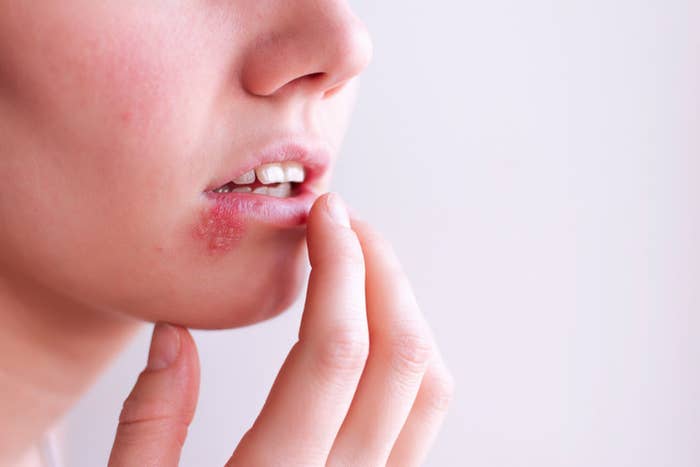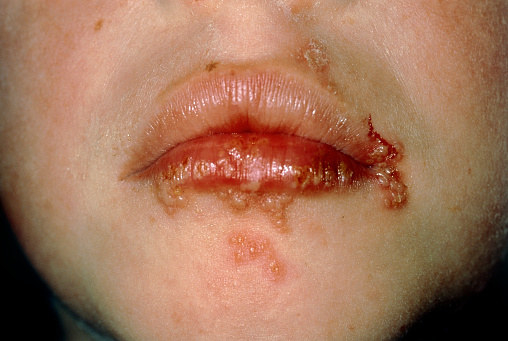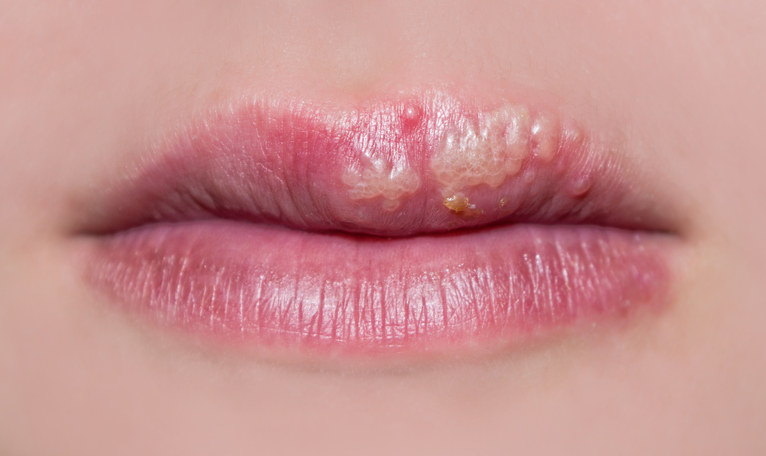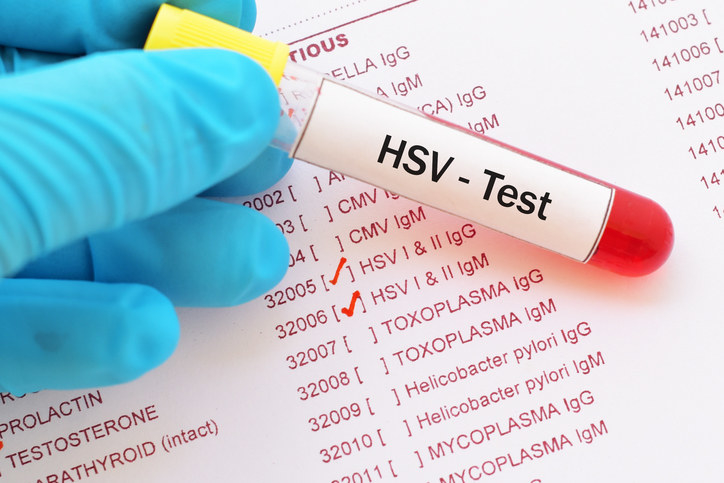You've probably heard about cold sores, or fever blisters, but you might not be completely sure about whether they are herpes, or if they are contagious.
First of all, yes: Cold sores are herpes.

"Cold sore" is just a more pleasant term for oral herpes, or infection with the herpes simplex virus. The herpes simplex virus is categorized into two types: herpes simplex virus type 1 (HSV-1) and herpes simplex virus type 2 (HSV-2). Both types of herpes are very common, highly contagious, and incurable — but they are treatable.
"Cold sores are most often caused by HSV-1, and we used to think they were only caused by HSV-1, but we now know that HSV-2 can also cause sores on the mouth or you can have both types or herpes — it's just less common," Dr. Michele S. Green, an NYC-based dermatologist, tells BuzzFeed Health. HSV-1 is usually transmitted through mouth secretions or sores (oral-to-oral contact). HSV-2, on the other hand, is almost exclusively spread by skin-to-skin or sexual contact, causing genital herpes.
They are not the same as canker sores, and typically ooze or crust over before healing — which can take weeks.

Although the two are often confused, they are very different. Canker sores are not contagious and tend to be inside the mouth or throat. And don't mistake other lesions around the mouth — like pimples or cracked lips — for oral herpes, either. "Cold sores are small ulcers, or blisters, on and around the lips that don't heal like other sores," Green says.
Cold sores often start with a tingling or burning sensation on the lip, which turns into a fluid-filled blister that eventually oozes and crusts over, Green says. But it can take several weeks to completely heal. Cold sores are usually pretty harmless, but they can become severe in people with weak immune systems. "People can also get a secondary infection if bacteria get in the sore, such as staph, so the sore will keep crusting and it won't heal unless they get treated for both," Green says.
HSV-1 is very common, and most people have it. But not everyone will get cold sores.

A lot of people are infected with the herpes simplex virus. According to the World Health Organization, an estimated 3.7 billion people under the age of 50 (or 67%) are infected with HSV-1, globally. HSV-2 is less common, but still prevalent. "If you were to give everyone blood tests, the number would be very high — up to 80% of people have HSV-1 — but a lot of people who have HSV-1 don't realize it because they never have any symptoms," Green says.
Most oral and genital herpes infections don’t cause any symptoms at all, according to the WHO. "The virus can lay dormant in dorsal root ganglia, a cluster of nerves on the spine," Green says. So you can live your whole life with HSV-1 and never get a cold sore. "Cold sores usually appear when the immune system is stressed — so when you're sick, fighting another virus or infection, have a debilitating cancer, or fatigued."
That’s actually why they’re called “cold sores,” Green says, because they tend to pop up when you have a cold. But the cold virus does not cause the sore; instead the body is more vulnerable, which can lead to a reactivation of herpes virus that is already present in the nervous system. Cold sores can also pop up if the body is stressed, like after surgery or too much sun exposure.
Cold sores are contagious, but you can still spread HSV-1 when you don't have a blister or any other symptoms.
Most people get exposed to HSV-1 through oral-to-oral contact, like kissing, but they might not be aware of it because people can transmit HSV-1 even if they don't have a cold sore. "The virus can be inactive for a long period of time but you can still be shedding the virus around the mouth and spread it to other people," Green says. So even if you don't have a cold sore or you think it's healed, you might still be contagious. You can actually spread oral or genital herpes without any symptoms, says Green, which is one reason why these infections are so prevalent.
Cold sores can lead to genital herpes when transmitted by oral sex.
HSV-2, the less common type of herpes, is almost always transmitted through skin-to-skin or sexual contact, leading to genital herpes. However, genital herpes can also be caused by HSV-1 if an infected person transmits the virus while performing oral sex. A growing number of genital herpes cases are caused by HSV-1, so don't just think of it as the "cold sore virus." A 2015 report from WHO estimated that 140 million people between the ages of 15–49 have genital herpes from HSV-1 transmission (oral-to-genital contact).
The only way to know if you have HSV-1 or HSV-2 is to get tested.

Routine screening for herpes is no longer recommended, but you should definitely check with your doctor if you think you were exposed or you have any symptoms. If you have an active outbreak, your doctor can swab the area and do a culture, Green says, but blood tests can also detect HSV-1 and HSV-2 if you don't have any symptoms.
If you do get a diagnosis, don't panic. Herpes is common and treatable and you can still live a normal, healthy life and have sex despite having oral or genital herpes.
If you have a cold sore, you can treat the symptoms with antiviral medications or over-the-counter products.
Typically, cold sores will go away on their own — but this can take several weeks, and in the meantime they can be really annoying. "Your doctor can prescribe antiviral medications in pill or cream form to help the sores heal faster," Green says. There are FDA-approved drugs for treating HSV-1, such as acyclovir (Zovirax and others), valacyclovir (Valtrex), and famciclovir (Famvir). If you get cold sores frequently, your doctor might suggest taking a small prophylactic dose of antiviral medication. Always keep the sore clean to avoid bacterial infections.
Over-the-counter ointments can ease symptoms, but they won't treat the actual problem, Green says. However, they won't hurt — so if you need your Carmex or Abreva, go for it. Carmex is a lip balm that contains ingredients like menthol and camphor to cool and soothe the area, while Abreva is a cream that may speed healing by blocking the virus. You can also try over-the-counter pain relief gels with numbing agents like lidocaine or benzocaine and cold compresses, according to Mayo Clinic.
You should also avoid kissing people, engaging in oral sex, and sharing lip products during an oral herpes outbreak.
If your lips are covered in cold sores, it's really easy to transmit HSV-1 to another person during oral-to-oral contact or oral-to-genital contact, so it's important to take precautions. To reduce the risk of transmission, you should avoid kissing and oral sex, and don't share anything that touches your lips and mouth, such as makeup, lip balm, washcloths, razors, utensils, etc.
When we say no kissing during an outbreak, we don't just mean smooching your partner. It means no kissing at all, even casual cheek or family kisses. And definitely don't kiss any babies (especially newborns), because a baby will have a harder time fighting the herpes virus off and they can get really sick.
Remember that anyone can get oral herpes and it's more common than you think.
Two-thirds of the population have the virus, and it can spread in countless different ways — it’s as simple as sharing a cup or lip balm. As we mentioned, you can still spread oral herpes virus when you don't have any symptoms, which is one reason why it's so common.
So technically, you're never 100% safe from getting herpes. But that doesn't mean you should never kiss anyone or have sex again — and it also doesn't mean you should throw all your safe sex habits out the window. It just means that this is a very common virus, it can happen to anyone, and there really shouldn't be any stigma about it.
